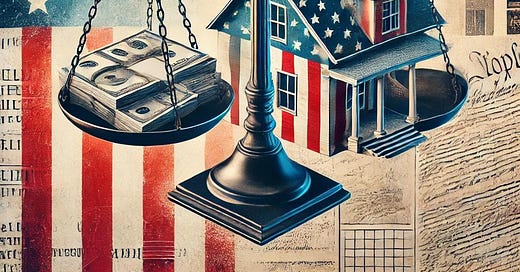How Can This Be Legal: Is Rent Control Constitutional?
Analyzing the legal challenges to price and eviction controls - and how they might impact the housing market
Thesis Driven’s next Fundamentals of Commercial Real Estate course is happening on August 7-8th at 3 World Trade Center in NYC! Read more and sign up here.
Today’s Thesis Driven, a guest letter by Jesse Strauss, examines the evolving law of “regulatory takings” and looks at some legal theories that could cause the United States Supreme Court to rule that price and eviction control schemes such as New York City’s rent stabilization program are unconstitutional – and what would happen next. Jesse Strauss is the former Vice President and General Counsel at Common Living, Inc. He now runs his own private practice, Strauss Law PLLC, focusing on real estate, dispute resolution, and corporate transactions. Jesse also offers fractional legal services for real estate companies through Your Fractional General Counsel and writes his own Substack, Fractionally Legal.
The United States makes housing affordable for millions of Americans through systems of price and eviction control on units owned by private landlords. Although the programs go by different names, for simplicity, I’ll call all these price and eviction control schemes “rent control.” While some landlords may voluntarily keep renewing leases at below-market rents either as a public service or just because they like the tenant, the vast majority of the owners of these units have been involuntarily drafted into the rent control system. Essentially, they have been forced to give up some of their property rights to fulfill the public good of providing housing at below market rents to a select group of tenants.
Rent control schemes exist, or are constantly being proposed, in states and localities across the nation as a response to increasing housing costs. Few people think of this as a radical system of wealth redistribution. It's just how we provide affordable housing.
Whether or not rent stabilization is a good idea is beside the point – that's a political decision. But sometimes a client rightfully asks me: “how can this be legal?” Given the Fifth Amendment’s Takings Clause, it's an honest question and an important one.
Despite what appears to be a string of defeats for landlords trying to challenge rent stabilization, the constitutional law around “regulatory takings” is in flux and the current Supreme Court is less restrained by precedent than at any time in recent memory.
We all know the value of quality affordable housing, but right now a small group of people (landlords subject to rent stabilization) are paying for it. Requiring the government to internalize the costs of paying for affordable housing could be the key to addressing the supply and demand imbalance that is at the root of housing affordability. A change in constitutional law could make that possible.
Today’s letter will look at why, under current law, rent stabilization is constitutional, and will look at potential changes in constitutional law that could make it unconstitutional. We will cover the following:
The context and brief history of the Takings Clause;
Current attempts to challenge rent stabilization as unconstitutional;
The new theories that could make rent stabilization unconstitutional;
What would happen if the government could no longer require private landlords to rent units at below-market rents without compensating them.






